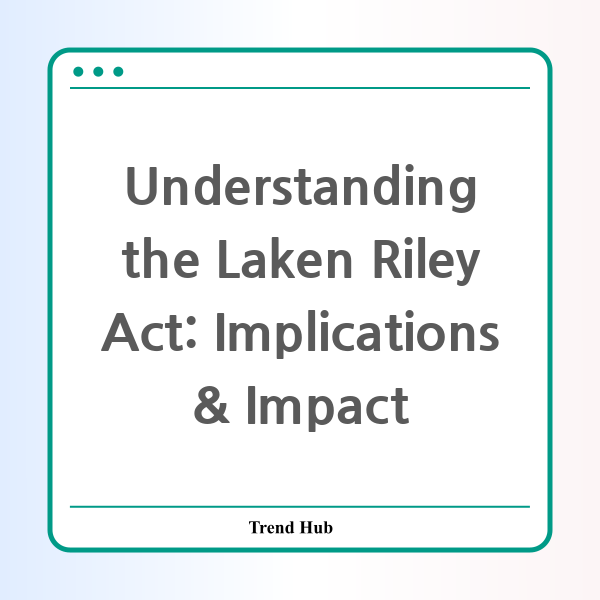* This website participates in the Amazon Affiliate Program and earns from qualifying purchases.

Have you heard about the Laken Riley Act? This new legislation, soon to be signed by President Trump, has sparked a considerable amount of discussion and debate across the nation. Named after a tragic incident involving a young nursing student, the act aims to reshape immigration enforcement in the United States significantly. Let’s delve deeper into what this act entails, its implications, and the ongoing conversations surrounding it.
The Laken Riley Act is designed to streamline the detention process for undocumented immigrants who are charged with certain crimes, particularly focusing on theft and violent crimes. It stipulates that federal officials must detain any migrant arrested or charged for offenses such as shoplifting or assault—an approach that has garnered bipartisan support yet raised a slew of concerns from various sectors of society.
To fully grasp the underpinnings of this legislation, it’s essential to understand its origin. The act is named after Laken Riley, a 22-year-old nursing student tragically murdered in 2023 by Jose Antonio Ibarra, an undocumented immigrant. The incident has become a rallying cry for proponents of stricter immigration laws, particularly among Republican lawmakers, who argue that had this legislation been in place, Riley might have been spared from such a heinous fate.
One of the core provisions of the Laken Riley Act is that state attorneys general can sue the federal government if they believe that the government’s immigration enforcement failures have harmed their state or its residents. This creates an unprecedented pathway for states to hold the federal government accountable for immigration policies that they perceive as ineffective.
Supporters of the act argue that it is a crucial step toward enhancing public safety and ensuring that those who enter the country illegally and commit crimes are not allowed to roam free in society. Representative Mike Collins articulated this sentiment, stating, "If this act had been the law of the land, he [Ibarra] never would have had the opportunity to kill her." This perspective reflects a broader trend where immigration is often intertwined with discussions of crime and public safety.
However, the Laken Riley Act has faced significant criticism from various immigrant rights advocates and some Democrats. Concerns have been raised about the potential stripping away of due process rights for migrants, including minors and those eligible for programs like Deferred Action for Childhood Arrivals (DACA). Critics argue that the act could lead to mandatory detention practices that disproportionately affect vulnerable populations, including children and long-time residents who might not pose any real threat.
Furthermore, many Democrats have questioned the lack of funding provisions in the act. They argue that while the legislation imposes new requirements on federal authorities, it fails to address the underlying issues within the immigration system that need reform. The concerns from lawmakers who supported this legislation but represent battleground states suggest that there is a significant divide in how immigration issues are perceived across the political landscape.
As President Trump prepares to sign the Laken Riley Act, the emphasis on tightening immigration controls in his administration becomes even clearer. With a hardline approach that includes multiple anti-immigration orders since taking office, including restrictions on birthright citizenship and refugee admissions, Trump's legislative agenda appears focused on enforcing stringent immigration laws.
In conclusion, the Laken Riley Act marks a significant shift in the U.S. immigration policy framework and raises critical questions about the balance between public safety and the rights of immigrants. As the national conversation continues, it’s essential for citizens to engage thoughtfully on this topic, weighing the implications of such legislation on the future of immigration in the United States.
* This website participates in the Amazon Affiliate Program and earns from qualifying purchases.